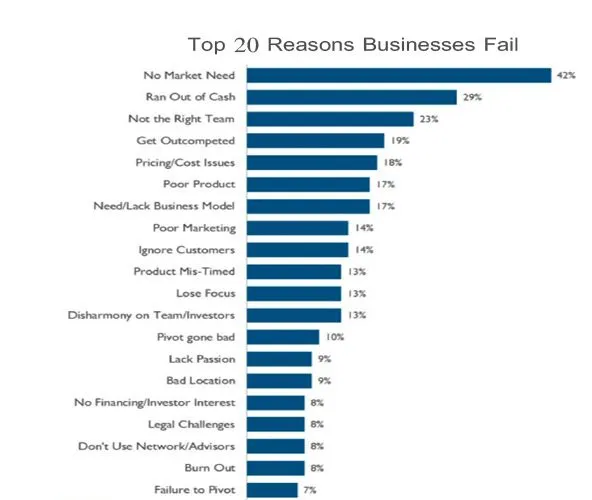Introduction
Thinking about opening a new business or owning your own small business?
There are unpredictable reasons for the business success and survival i.e. both external and internal factors. A large number of business failure and success depends on the problems defined externally. Most small business owners have limited experience in management while tend to have technical or professional skills. This can result in subsequent reversal of the fortune in the widespread business failure. Everyone including suppliers, investors, employees and customers lose when a business owner fails.
How businesses can vigorously protect themselves from any threat?
According to the recent stats and figures:
- 90% of the business failure results due to cash flow problems
- Net profit margins expanded to 10% in 2017, which is up from 5% in 2016
- 80% of the business owners serve 2 years in business, 50% of all businesses form it 5 years, 30% sustains 10 years
- 50% of business owners strike cyber attacks, only 20% of small businesses rates their ability to mitigate vulnerabilities, cyber risks and highly effective attacks
- 50% of the entrepreneurs start their business at home while around 10% of owners of small businesses close each year
For each small business owner some questions are more important in answering them:
- Check the total full-time personnel currently employed by your business.
- In what region is your business located?
- Discuss gross sales or revenues for your most recent fiscal year?
- Which best describes your business?
- Which best describes the industry or sector in which your business operates?
People around you are full of ideas. Some of them even like to blurt some whenever there is a chance. Pretty often, a friend of mine comes up with new viable business ideas, but seldom does the course looks good to drag it to the market. Well, not exactly drag it, should have said ‘bring it.
Well, apparently I walked him to his testing room where he gave me some samples of a dessert he had prepared. It was good, had potential, only if the packaging and marketing of the same weren’t too challenging. Soon he trashed the idea and that’s where he failed.
Well, that’s the story. That is how many innovators goof up. People give up soon thinking it might not work, or might require a great deal of effort to get it up and working. It is disappointing to have the sudden idea rush, only to drop it into the bin. Usually, there are some essentials for invention and product development.
Internal causes of Business failure
- Lack of management:
Managing a successful SME requires not only good creative and operational skills but good business and managerial skills too. Many SME’s do not have the skills in the areas such as financial reporting, marketing, customer relations and financial management.
- The deficit in invoicing:
Poor invoicing practices reflect the company’s financial statements that won’t give a true and fair view of the financial position of the company.
———————————————————————————————————————————————————
- Incompetent sources of finance:
An unbalanced mix of risk capital and loan capital represents threats to the solvency of the business. If the company starts to experience financial difficulties, insufficient risk capital will only worsen the situation. The unsuitable options offer to experience financial difficulties, insufficient risk capital, existing loan capital prevents raising further debt finance.
- Poor debts:
The bad debts may increase significantly due to insolvency or the disappearance of a customer. The in-house credit collection management undertakes regular credit control activity and follows up on matters of going concerns.
External causes of business failure:
- Strict governmental measures may affect specific sectors of business activity and impose a stringent burden on SMEs.
- The bankruptcy of Main Customer or Supplier
STEPS THAT WILL STOP BUSINESSES FROM FAILING
- Passion in business is important:
When you have the passion to think new, you can develop something that could be a blessing for the world. Blend passion with enthusiasm to let others know of the worthiness of the idea, and of course to convince yourself.
Again, thinking of an idea is much easier than actually churning out a course of action. You got to put in a hard day at work before your market and potential customers realize that this is what they’ve been looking for.
- Look out for more questions:
Ideas when discovered do serve some purpose but may have loopholes to be looked upon. You may at a later stage, find out that it’s not working out the way you thought it would. It happens!
For example – I once decided to start up a venture in partnership with 3 others. Before we really got into it, we pondered over all the negatives and challenges that may occur at some point, like disputes, money matters, and other mumbo-jumbo.
This could be frustrating for someone who just wants to enjoy the idea and not look at possible issues. But, it’s annoying for me not to list such issues in advance to lessen the amount of risk and uneasiness later.
- Running a Beta Test:
Many times when you think that the idea is nearly on track, you notice that it may still require another round of touch up. This is when you actually could run a survey and ask for opinions. Trial and run could work nicely. For example – Run a survey asking how this product ‘Abc’ could help you. Ask if they would need it at all or do without it too using NPS Software.
Once done, launch your idea and observe the reaction of the consumers to pick out the shortcomings and again put together a better one.
- No Foolproof:
When you develop and launch a product, keep in mind that it’s not Foolproof. There isn’t one way to fix the product. A lot of tweaks can turn your product into a much better one. You should start with the basics, as in step by step. Launch your idea in versions; let the audience play with it for some time and offer valuable feedback.
- Manage cash flow:
Startup businesses struggle with a lot of cash flow issues. In order to manage to get effective cash flow, the startup company must do what it brings in revenues limiting expenses. Protect the company’s financial assets to avoid business failure. The businesses should have a close view of their investments and maximize the profits thereon.
- Plan for the future:
Make decisions depending on what you know that gives the vital outline for the business success. The online invoicing software provides resources for small business owners to develop their plans and launch their efforts.
Conclusion
It’s evident that you might have to face negative feedback, but that shouldn’t invalidate your morale or idea, instead should strengthen the preposition and encourage you in that manner. To achieve business success depends upon good luck, putting in place measures and go ahead with the strategies that help you to succeed.
Handle the business metrics like a pro while choosing an online invoicing software like Invoicera. Plan and forecast your business with proper account receivables, aging reports, keeping track of inventory turnover and operating margins.
FAQs
Q. What are the signs of business failure?
A. These factors are responsible for a business failure-
- Financial Crisis
- Declining Sales
- Cash Deficits
- Drastic Spending Cuts
- Your Own Customers Make Late Payments
- Loss of key customers
Q. When is a business profitable?
A. In order to be considered profitable, a job must generate sufficient gross profit. To break it down, the revenue you receive from the job should be enough to cover the job costs. For a business to be profitable, the gross profit from all active jobs must be sufficient to cover your overhead costs. Also, to be successful and stay in business, both profitability and growth are important and necessary for a company to survive and remain attractive to investors and analysts. Profitability is, of course, critical to a company’s existence, but growth is critical to long-term survival.
Q. How to prevent startups from failure?
A. Be close to your customers, keep taking the reviews and feedbacks
Keep product costs at a reasonable level
Invest in the right team of experts
Be flexible enough to make quick decisions
Make a strong yet easy-to-understand marketing plan
Accept criticism and improve the strategy
Q. What are the 5 critical success factors for businesses?
A. Top 5 critical success factors for any business are-
- Strategic Management/ Planning
- People
- Marketing and sales
- Product and service
- Process and systems
Q. Should you establish a time limit for a new business to generate a profit?
A. Profitability is measured differently in different startups. Conventionally, it can take two to three years, but that doesn’t necessarily mean you do poorly. The entrepreneur can draw an income from a business even if it makes a loss on paper, while investors can benefit if they get a fixed interest rate back on their investment, regardless of how the business is doing.
Q. What is the failure rate of small businesses?
A. As a recent report by Fundera, about 20% of small businesses fail within the first year. By the end of the second year, 30% of businesses will have failed. By the end of the fifth year, about half will have failed. And by the end of the decade, only 30% of businesses will still exist – a failure rate of 70%.




















